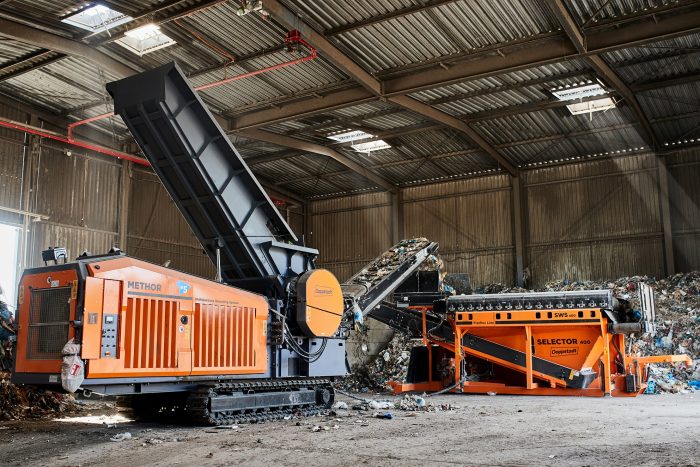Amendment to the Biowaste Ordinance: New Doppstadt Solution Enables Compliance with Requirements

The amendment to the Biowaste Ordinance (BioAbfV) has met with widespread criticism from associations and experts. They claim that the requirements it contains are technically unfeasible. Doppstadt Umwelttechnik GmbH has now developed a mobile modular processing concept which, when the BioAbfV comes into force, increases legal certainty for plant operators, reduces disposal costs by significantly reducing screening residues, and increases the amount of compost that can be spread and is free of impurities. Through the smart combination of individual machines, operators benefit from greater efficiency in plant operation and a rapid return on investment (ROI). Compliance with the required limit of less than 0.5 percent foreign matter in biowaste prior to the first biological treatment is very possible, depending on the existing framework conditions. Doppstadt has already sold the first mobile-modular plants to a large biowaste processor – including a follow-up order.
“Our mobile modular plant concept already provides solutions for the future requirements of the legislator. It combines legal security with economic benefits, flexibility and risk minimization. In our view, the amendment to the Biowaste Ordinance is therefore not a handicap, but an opportunity for plant operators,” says Michael Zeppenfeldt, Sales Manager Germany at Doppstadt Umwelttechnik GmbH.
The Doppstadt plant concept is based on a combination of mobile machines that are suitable for different purposes, take up comparatively little space and do not necessarily have to be operated in a hall. In the event of legal changes in the future, users can therefore react flexibly and with cost certainty: either by replacing, expanding and/or converting the plant structure or by selling the individual machines on the market.An exemplary plant configuration for contaminant removal in the biowaste sector consists of just three mobile Doppstadt machines.
Due to the modularity of the system, the conversion or expansion of the processing concept can be realized flexibly and at short notice, depending on the input quantity and material. The investment costs for such a plant concept are well below one million euros. Combined with the efficiency gain and the savings in disposal costs, the ROI on the acquisition of a mobile-modular Doppstadt solution can be around two to two and a half years. In addition, plant operators benefit from a considerable reduction in the administrative work involved in the approval process (compared with stationary plants) and are not dependent on the price or quota requirements of third-party plants.
Significant savings in disposal costs
With upstream separation, contaminants can be separated in a more targeted manner without simultaneously removing the good recyclable biowaste. This saves plant operators considerable disposal costs,” says Zeppenfeldt. Upstream sorting by mobile modular plants makes it possible to reduce the amount of screenings to be disposed of by around 60 to 70 percent, regardless of what legislation requires and to what extent.Doppstadt has been able to reduce the amount of contaminants to a limit of 0.5 mass percent in various plant trials. “It is undisputed that the amendment to the BioAbfV will have a lasting impact on the technology to be used – plant operators will have to invest. However, upstream contaminant removal with our mobile modular plant concepts is not only technically possible, it also pays off very quickly,” Zeppenfeldt emphasizes
For more information, please visit: https://www.doppstadt.de/en/
News Categories
- » NEWS HOME
- » Automation & Robotics
- » Industry 4.0
- » Material Handling
- » Sensors
- » Quality & Testing
- » Machine Vision
- » Laser & Optics
- » Metalworking
- » Motion Control & Drives
- » Hydraulics & Pneumatics
- » Process Industry
- » Renewable Energy
- » Agriculture
- » Home & Office Furniture
- » Environmental Tech









